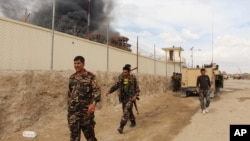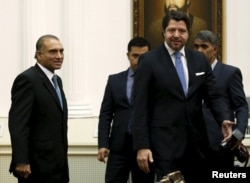Pakistan has rejected Afghan allegations its intelligence agency is behind the Taliban’s resurgence and that Islamabad is not helping in efforts to end the war in Afghanistan.
In a speech to the Afghan parliament this week, acting spy chief, Massoud Andarabi, directly blamed Pakistan’s Inter-Services Intelligence or ISI for “completely supporting and encouraging” the Taliban to extend its influence and capture Afghan territory.
“It is unfortunate. Such assertions are baseless and contrary to the facts. Pakistan is fighting terrorism and extremism with full resolve and determination,” foreign ministry spokesman Mohammad Nafees Zakaria told a weekly news briefing in Islamabad Thursday.
Top Taliban leaders, Afghan officials say, are sheltering in the neighboring country and directing insurgent attacks from their sanctuaries across the border.
Taliban fighters among refugees
Pakistani officials acknowledge presence of Taliban fighters among nearly three million Afghan refugees they have hosted for decades, but say the militants have now either gone back to Afghan areas under the Taliban’s control or their movements have been effectively restricted.
Islamabad says the steps are part of a major anti-terrorism military-led campaign underway near the Afghan border and elsewhere in Pakistan.
“We are engaged in operations against the terrorists without any discrimination. Terrorism is a common enemy and we need cooperation and collaboration to fight this menace and not confrontation. Accusation and blame game will strengthen the hands of terrorists and miscreants,” the Pakistani spokesman asserted.
He also responded to this week’s remarks by Afghan deputy foreign minister Hekmat Khalil Karzai in which he questioned Pakistan’s commitment to promoting an Afghan peace and political reconciliation process
Peace talk issue
Zakaria said that a four-nation panel, consisting of diplomats from Afghanistan, Pakistan, China and the United States, has been making “serious efforts” for arranging early direct talks between the Afghan government and the Taliban.
“In the larger interest of Afghanistan, we believe that the focus should be to convene early peace talks and no one should doubt Pakistan’s sincerity. Peace and stability in Afghanistan is in Pakistan’s interest. Our stakes in peace in Afghanistan are much bigger than any other country,” he noted.
An initial meeting between Afghan government and Taliban negotiators was expected to take place in Pakistan in the first week of March.
But the insurgent group in a last-minute announcement refused to attend and instead vowed to intensify hostilities in the coming warmer Afghan months.
Leaders in Kabul insist Islamabad assured them through the four-nation panel it would take action against insurgent Taliban commanders present on its soil if they refused to come to the table for talks and quit violence.
“But it seems the assurances that we were given by Pakistan have not yet been delivered or have not yet been met,” Karzai said on Monday, who is also the chief peace negotiator of the Afghan government.
Pakistan and Afghanistan, under pressure from the U.S. and China, have in recent months jointly worked to fight terrorism and cooperate in ending the Afghan conflict.
In recent weeks, Pakistani officials have also blamed fugitive militants hiding on the Afghan side of the border for deadly attacks in Pakistan and have demanded Kabul take action against them.
The return of the war of words between the two countries, critics say, is likely to strain bilateral ties, which are already marred by years of mistrust and suspicion.





